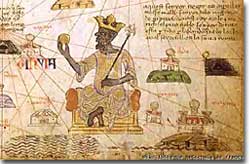7b. Mali: A Cultural Center

Mansa Musa, greatest king of Mali, is shown on this Spanish map of Africa.
What would life be like if a magician ruled the land? The history of ancient Mali gives us some hints. The founder of this West African kingdom was well known among his people as a man of magic with more than a few tricks up his sleeve.
Before the sorcerer's reign, and the Malian kingdom's birth, years of competition and fighting took place in the lands west of the upper Niger River. A series of fierce battles took place, and in the 13th century C.E., a group known as the Soso emerged victorious. The Soso's new lands, which had once belonged to the kingdom of Ghana, were like giant pots of gold. But before the Soso could settle in and enjoy the wealth, the great "sorcerer-king" Sundiata moved in to take over.
The Lion King
Sundiata claimed that Mali was his by right of inheritance and in 1230 A.D he defeated the Soso and took back the land. According to legend, Sundiata's rival, King Sumanguru, was also a sorcerer. Sumanguru conjured up the heads of eight spirits for assistance. Sundiata had stronger magic. He defeated the eight heads and then shot an arrow, which grazed Sumanguru's shoulder, draining him of all remaining magic. With a pat on the back, Sundiata declared himself ruler, or mansa, of the region and set up capital in the city of Niani.

The mosque at Timbuktu was the heart of the kingdom of Mali. The empire of Mali expanded after the fall of Ghana, reaching its height under the rule of Kankan Musa (c. 1312-1327 C.E.). Many monumental mosques were constructed during the reign of Mansa Kankan Musa who is still remembered as a great Islamic ruler.
Sundiata, also known as the "Lion King," was determined to make changes, and indeed he did. He decided to assign specific occupations to particular kin groups and developed a social organization similar to a caste system. For example, if born into a family of warriors, one was destined to be a warrior. If born into a family of djeli, or storytellers, one was destined to join the djeli tradition. Choice of destiny was not an option.
This system conveniently meant that if born into a family of mansa, one was part of the ruling dynasty — the Keita. It was one of Sundiata's "tricks" to keep power in the family.
For the most part, the system worked. However, for a short time, power escaped the Keita hands and landed in those of a former slave. The disruptive reign of the ex-slave, known as Sakura, paved the way for Sundiata's nephew, Mansa Kankan Musa, to back the throne. Best known for his wealth, his generosity, and his dedication to Islam, Mansa Musa took the kingdom to new heights.
A Golden Pilgrimage
Through involvement in the gold trade that swept through Africa and reached all the way to Europe, Mansa Musa led Mali to great riches. The region's prosperity was nothing new, but based on Egyptian records, Mansa Musa's display and distribution of the wealth was unprecedented.
In 1324, the great Mansa Musa set out on a pilgrimage to Mecca. Decked out in his finest clothes, he passed through Cairo with 500 slaves, each of whom carried a six-pound staff of gold. Backing them up were 100 camels, carrying in sum over 30,000 more pounds of the precious metal.

The African gold trade was indeed a lucrative one, as shown by this gold from Ghana.
Surely this was a sight to behold, and the accounts left behind say that the show got even better. While cruising through Cairo, Mansa Musa reportedly handed out gifts of gold to bystanders. He entertained the crowds and made a lucky few suddenly rich.
In Mansa Musa's Hands
Aside from being generous, Mansa Musa made an important mark in Mali by introducing the kingdom to Islam and making it one of the first Muslim states in northern Africa. He incorporated the laws of the Koran into his justice system. Cities such as Timbuktu and Gao were developed into international centers of Islamic learning and culture. Elaborate mosques and libraries were built. The university arose in Timbuktu might well have been the world's first. The cities became meeting places for poets, scholars, and artists.
Though not everyone accepted the new faith and culture, a strong relationship between religion and politics quickly developed. Mansa Kankan Musa ruled with all the ideals of a fine Muslim king. He died in the mid-14th century, and Mali was never quite the same. Internal squabbling between ruling families weakened Mali's governing and its network of states started to unravel. Then, in 1430, a group of Berbers seized much of Mali's territory, including Timbuktu.
Though the wealth and power that Mali possessed was swept up quickly by the next great empire, its legacy stands proudly. The pioneering spirit and groundbreaking accomplishments of Mali's kingdom make its rise and fall an important chapter of African history.







